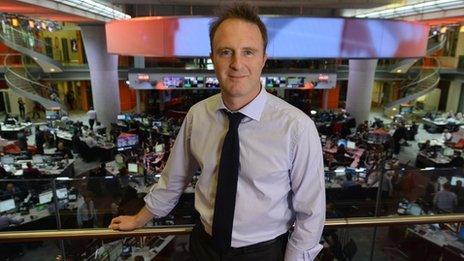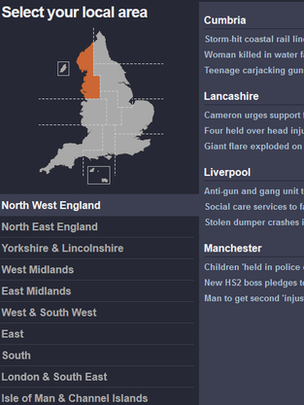James Harding defends local BBC news against critics
- Published

James Harding took up his post in August 2013
News director James Harding has spoken out against the "mistaken view" the BBC should "rein in" local news coverage for fear of damaging local newspapers.
Mr Harding said during a speech at the British Library that the corporation had a public service duty to "deliver on its obligation in local news".
"Economic woes" of the local newspaper industry were "not the BBC's fault", he said during the WT Stead lecture.
"The classified advertising market has moved online", he added.
Mr Harding said the drift of classified marketing from local papers to the internet had resulted in financial difficulties for the regional press.
"The local newspaper industry's problems lie with the likes of Google, Facebook, Amazon, Gumtree, eBay and a long, long tail of others. I am acutely concerned by the pressures facing the local newspaper industry and we at the BBC will do anything to help," he said.
His remarks follow those made in November by Home Secretary Theresa May, who told the Society of Editors, external that the BBC had to think "carefully" about its local news service.
She said: "Local newspapers are having a particularly hard time. That has partly been the result of the BBC's dominant position on the internet, and its ability to subsidise the provision of internet news using the licence fee.

The BBC's local news service includes regional online sites
"This makes it enormously difficult for local newspapers to compete. If the BBC can, as they do, provide all the locally significant news, what is left to motivate the local reader to buy a paper?"
She added that the corporation was "destroying local newspapers and it could eventually happen to national newspapers as well".
Mr Harding, who previously edited The Times, said the BBC's regional bulletins attracted some of its largest audiences for news.
"We have a direct interest in the health of local newspapers and regional newsrooms," he said. "We thrive thanks to vibrant public debate and courtesy of the stories and ideas unearthed by our colleagues in rival news organisations."
But he added that the BBC's primary responsibility must be to "serve licence fee payers".
"They want and are entitled to the best possible local news services we can deliver," he said.
Following the recent scandal of executive payoffs and fallout from the dropped Newsnight investigation into Jimmy Savile, Mr Harding also spoke about the need to retain the trust placed in the BBC by the public.
"Trust is our most prized asset - and the key to our future," he said. "It depends upon us striving, ceaselessly, to be fair, reliable and open to ideas."
He stressed the BBC's "uncompromising commitment to accuracy, impartiality, diversity of opinion and the decent treatment of people in the news".
Commenting on the issue of press regulation, Mr Harding highlighted the need for a free and independent press.
"I worry when politicians and judges weigh in, " he said, "either frequently or eagerly, on the behaviour of journalists and news organisations."
"At a time when our society needs curious, inquisitive journalism more than ever, I think we need to be extremely vigilant against encroachment on press freedom and freedom of expression," he added.
- Published2 July 2013
- Published31 October 2013
- Published4 December 2013
- Published12 August 2013